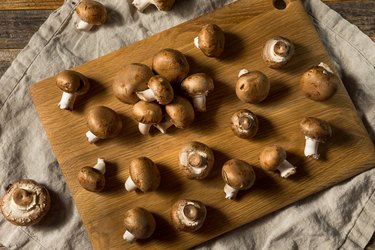
Baby bella mushrooms, also known as criminis (or portobellos when they reach full size) are a type of fungus commonly used in cooking, says Bon Appetit. In addition to their appealing taste, baby bella mushrooms provide a number of important health benefits. Mushrooms should be eaten within two to three days of their sell-by date for optimal taste and nutrition benefits, notes Principles of Food Science.
Basic Baby Bella Mushroom Nutrition
Video of the Day
According to the U.S. Department of Agriculture, 1 cup of baby bella mushrooms contains approximately 19 calories, 4 grams of carbohydrates, 2 grams of protein and a half gram of fiber. In addition, a cup of baby bella mushrooms provides moderate amounts of potassium and phosphorous — 390 and 104 mg, respectively — both of which are important minerals for optimal health. Finally, baby bellas provide other vitamins and minerals in small amounts, including calcium, magnesium, sodium and folate.
Video of the Day
Improved Immune Function
Baby bella mushrooms can lead to improvements in immune system function, according to Nutrition Therapy and Pathophysiology. In fact, the phytonutrients found in baby bella mushrooms can promote activity shifts in white blood cells in the body, including mircrophages, macrophages, and dendritic cells (Reference 3). Over time, the activation or deactivation of certain white blood cells can prevent or reduce the risk of diabetes, arthritis and other health conditions (Reference 3). Though fresh baby bell mushrooms are highly effective at boosting immune system function, dried or powdered alternatives can also aid in the clearance of pro-inflammatory molecules (Reference 3).
Reduced Risk of Chronic Disease
Baby bellas can also be effective in the prevention of a number of chronic health conditions, such as cardiovascular disease and some types of cancer (Reference 3). In fact, these mushrooms have been shown to contain high amounts of conjugated linolenic acid — which decreases estrogen production and may reduce the risk of some forms of breast cancer, says Nutrition Therapy and Pathophysiology. Similarly, baby bella mushrooms may help in lowering the risk of oxidative damage to blood vessels in the heart, thus reducing the risk of cardiovascular disease. Regularly consuming baby bella mushrooms may also reduce the risk of hyperlipidemia, diabetes and Alzheimer's disease.
Enhanced Bone Health
In addition to its macronutrient content, baby bella mushrooms contain certain micronutrients, including vitamin D. Concentrations of this micronutrient are increased when the product is exposed to light — and therefore, the specific values of vitamin D may vary depending on the locale in which the mushrooms are grown. While there are a number of benefits associated with vitamin D intake, its role in bone health through the absorption of calcium and phosphorous is especially crucial (Reference 4).